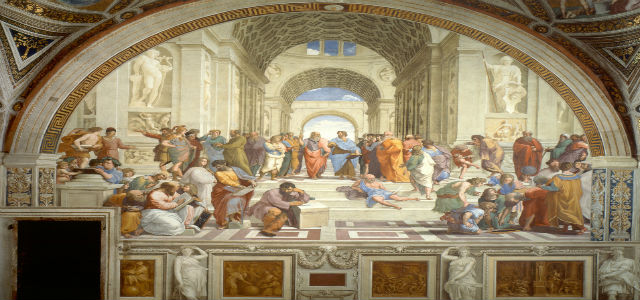Reviews:
Creators, Conquerors, and Citizens: A History of Ancient Greece by Robin Waterfield
Jesus as Philosopher: The Philosophical Sage in the Synoptic Gospels by Runar Thorsteinsson
What have the Greeks ever done for us? As Robin Waterfield relates in detail in Creators, Conquerors, and Citizens, the ancient Greeks gave us a basis for philosophy, art and architecture, sport as a noble pursuit, and our democratic system of government. But there are also major differences, such as who benefits from democracy.
Although Waterfield begins with life on the land, as most Greeks were farmers, he emphasises that a sense of Greekness came not from the land but from a shared culture. Greece as the country we know it today came into existence only in the nineteenth century. Ancient Greece was dominated by city states that were only loosely aligned and were happy to fight each other but were also happy to unite against common enemies. (Readers might tire in this account of all the armies marching back and forth.)
From the eighth century BC, these city states diverged from the monarchism of their Near Eastern counterparts, and democracy flowered. Greek democracy was more democratic in one sense than our own, as it involved full participation in decision making (a radical but also inefficient innovation), though of course it involved the exclusion of women and slaves (and children). Greek society remained hierarchical, and only the rich elite could afford the time to be involved in running for government, even if they still needed, through the democratic system, the support of the poor.
These rich elites cultivated a distinct culture of art and poetry, quite different to Jewish and later Christian culture, with liberal attitudes to nudity and sex. The artistic culture so celebrated by the Renaissance was not entirely a Greek invention though, borrowing at times from the Near East. Later, Greek aggression and trade would spread Greek culture across the region. The Greek alphabet helped the spread of literacy. Alexander the Great was particularly spectacular at spreading Greek culture. But it worked both ways. Greek expatriates would bring non-Greek gods back into the Greek pantheon, creating the vast polytheism Saint Paul addressed when evangelising the Greeks.
By Paul’s time, Greek religion had become more personal and individual. Previously, Greek religion was not what we understand as religion and was largely a matter of public ritual. It related to the state of the nation, not the soul. Within the Greek understanding of community, failure to do right by the gods was a crime against the state.
By Paul’s time the Greeks had also made spectacular discoveries. Philosophy included mathematics and science, what the Greeks thought of as understanding the world, but it also included ethics. There were rival schools of Cynicism, Stoicism, Epicureanism and Scepticism, all somewhat more positive than our modern caricatures of them, and more practically focused than the earlier Platonic philosophy. Additionally, these schools argued for the well-rounded person, giving us a fairly modern concept of the individual. The leaders of these schools emphasised virtue ethics over arguing about particular ethical issues or following rules. These leaders exemplified this outlook, intuitively making good decisions because they had worked hard to cultivate an overall positive orientation.
In his book Jesus as Philosopher, Runar Thorsteinsson argues that Athens does have something to do with Jerusalem in that we can see that these Greek (and Roman) moral sages influenced the Gospel writers’ portrayals of Jesus. Although their theology was Jewish, these writers wrote in Greek and knew Greek culture (because of the spread of Greek culture through Alexander’s conquests centuries before), including the philosophical schools. The Gospel writers portrayed Jesus in this tradition, and, indeed, although Jesus is compared to Abraham, Moses and David, in the Gospels he acts at times quite differently, in particular in his understanding of messiahship.
Like Socrates, Jesus is accessible to commoners and dies unjustly. Although Matthew portrays a Jesus who displays his emotions, Luke’s Jesus is calm under pressure, a virtue praised by the Greeks and exemplified by Socrates. Jesus has moral authority and, like the Cynics, is uninterested in material wealth. He traps the leaders of the day with his wisdom, exposing their self-interested motivations. We can find in Greco-Roman philosophy parallels to Jesus’ sayings, particularly in Matthew’s rendering of the Sermon on the Mount.
So what have the ancient Greeks done for us? For one, according to Thorsteinsson, they are partly responsible for our picture of Jesus.
Nick Mattiske






